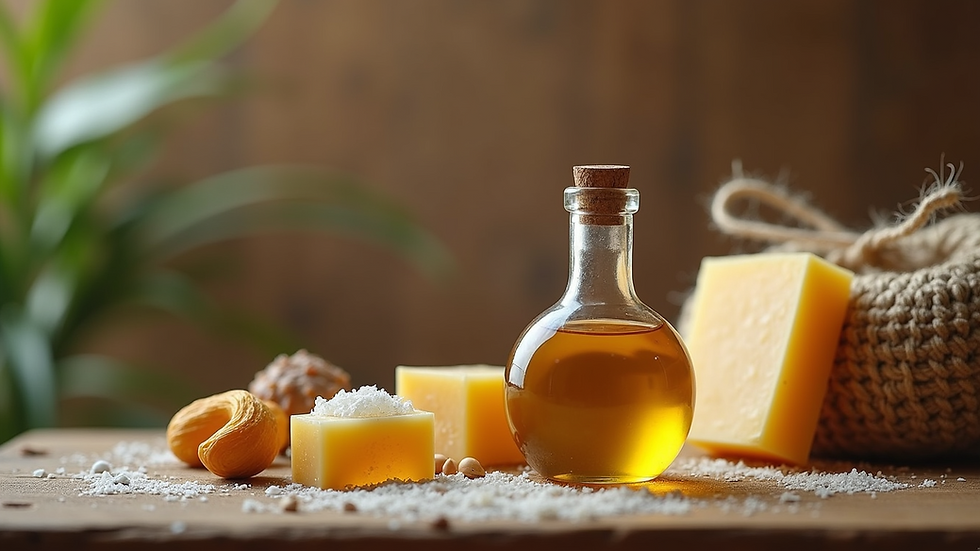Essential Supplies for Handcrafted Soap-Making
- craftedsurprise
- Jul 14
- 4 min read
Handcrafted soap-making is a rewarding hobby that allows creative expression while producing valuable shower products. Whether you are a beginner or an experienced artisan, having the right supplies is crucial for crafting beautiful and functional soaps. This comprehensive guide will take you through the essential supplies needed for soap-making, offering not just a list but also practical advice, tips, and creative ideas to enhance your soap-making journey.
Essential Soap-Making Supplies
To start with soap-making, you need to gather specific ingredients and tools. Here’s a detailed breakdown of the essential supplies:
1. Oils and Fats
The base of any soap is formed from oils and fats. These ingredients contribute to the soap's quality, lather, and moisturizing properties. Common oils include:
Olive Oil: Adds moisture and is gentle on the skin.
Coconut Oil: Creates plenty of lather and hardness in soap.
Palm Oil: Provides stability and a creamy lather.
Shea Butter: Softens and moisturizes the skin.
It's often recommended to balance the oils to achieve the desired hardness and conditioning properties. For example, a combination of coconut and olive oil can yield a well-rounded soap.

2. Lye
Lye, also known as sodium hydroxide, is a crucial ingredient in the saponification process, transforming oils into soap. Safety is paramount when handling lye, as it is caustic. Always wear gloves, goggles, and work in a well-ventilated space.
When calculating how much lye to use, it’s essential to follow an accurate soap-making calculator. This will help ensure that the oils are completely converted into soap, preventing any leftover lye that can irritate the skin.

3. Fragrance and Essential Oils
Adding fragrance is what makes your soap truly special. You can choose between synthetic fragrance oils and natural essential oils. Essential oils not only impart pleasing aromas but also provide therapeutic benefits.
Some popular choices include:
Lavender: Known for its calming effects.
Peppermint: Refreshing and invigorating.
Lemongrass: Provides a fresh, citrusy aroma.
Make sure to read the usage rates for each oil, as some can be potent and require dilution.
Do I Need FDA Approval to Sell Homemade Soap?
If you plan to sell your homemade soap, you might be wondering about regulatory requirements. Generally, if you are making soap that is labeled and marketed for cleaning purposes, you may need to adhere to the Consumer Product Safety Commission (CPSC) regulations.
However, soap is classified as a cosmetic product if it's intended to affect the body’s appearance. Thus, if you are only marketing the product as a soap without any claims of health benefits, you may not need to reach out to the Consumer Product Safety Commission (CPSC). Always check local regulations to ensure compliance.
4. Colourants
Colourants can enhance the visual appeal of your soap. It’s crucial to choose the right type of colourant, as some may not be suitable for soap-making. Options include:
Mica powders: For vibrant colours and a glittery effect.
Liquid dyes: Easy to mix and provide a wide spectrum of shades.
Natural colourants: Like turmeric or spirulina for those preferring natural ingredients.
While colour can be important, remember not to overload your soap with too many colours as it may affect the saponification process.

5. Moulds
Selecting the right mould is essential for determining the shape and size of your finished soaps. There are various types of molds available, including:
Silicone molds: Flexible and easy to use, ideal for intricate designs.
Wooden molds: Sturdy and suitable for traditional bar soaps.
Plastic molds: Lightweight and available in a variety of fun shapes.
The type of mould you choose may influence the look of your final product, so feel free to experiment.
6. Safety Gear
When making soap, especially with lye, safety gear is non-negotiable. Here are some essential items to have:
Gloves: To protect your skin from lye.
Goggles: To shield your eyes from splashes.
A mask: If you're working with fragrances or colourants that might irritate.
Also, keep a first-aid kit handy, just in case of any spills or accidents.
7. Measuring Tools
Accurate measurements are key to successful soap-making. You will need:
Digital scale: For weighing oils and lye accurately.
Measuring cups and spoons: For smaller quantities, especially when adding fragrance or colourants.
Remember to use separate tools for lye and oils to avoid cross-contamination.
Additional Considerations for Soap Makers
As you dive deeper into soap-making, consider the following tips and additional supplies that can enhance your crafting experience:
1. Mixing Tools
Using the right mixing tools is important for achieving emulsification. A hand blender is preferred for its efficiency, but stick blenders or whisks can also work for smaller batches.
2. Recipes and Ideas
Experimenting with different recipes helps broaden your expertise. Look for inspirational blogs, social media groups, or even online courses that can guide you on your soap-making journey.
3. Packaging and Labeling
If you plan to sell your soap, carefully consider how you will package and label your products. Make sure to include the ingredients list, any safety warnings, and your brand information. Attractive packaging can elevate your product and entice potential buyers.
4. Storage
Lastly, ensure you have a clean and organized workspace to store your soap as it cures. Proper storage helps in maintaining the quality of your product.
Using quality handcrafted soap supplies can significantly impact your results. The right supplies not only improve the final product but also enhance your overall soap-making experience.
Start Your Soap-Making Journey
Venturing into handcrafted soap-making can be immensely satisfying. By ensuring you have the essential supplies discussed in this post, you’re setting yourself up for success. Remember to always prioritize safety, experiment with different materials, and, most importantly, enjoy the creative process! Happy soap-making!




Comments